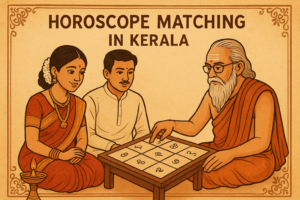
Horoscope matching in Kerala, traditionally known as Kundali porutham or Jathakam porutham, holds a deeply rooted place in the cultural and matrimonial practices of the region, blending centuries-old astrological wisdom with the social values of harmony, stability, and familial compatibility. In Kerala, where both Hindu and certain non-Hindu communities have historically embraced astrology as a guiding force in shaping important life decisions, horoscope matching is often seen not merely as a ritual but as a thoughtful assessment designed to ensure the well-being of the couple and the longevity of their relationship. The process typically begins when two families express interest in a potential alliance; before discussions progress, the jathakams—birth charts based on the precise time, date, and location of birth—are exchanged and evaluated by an astrologer who is trusted for accuracy and spiritual insight. This astrologer examines several layers of astrological factors, including the positions of the moon, planetary alignments, and the compatibility of nakshatras (birth stars), which play an especially important role in Kerala’s astrological traditions. Among the most well-known matching systems is the nāḷ porutham or star-based compatibility check, in which qualities such as temperament, emotional balance, health, prosperity, and familial harmony are analyzed through a structured set of criteria. The presence or absence of doshas—astrological faults like Mangal dosha—is also carefully evaluated, as these are believed to influence marital harmony, health, or financial prospects. While many people today view these evaluations symbolically or as cultural formalities, for others they remain vital indicators used to avoid potential misalignments that could manifest later in life. In Kerala, the process usually retains an atmosphere of reverence, with astrologers approached not just as technical experts but as custodians of ancestral wisdom, often combining mathematical precision with intuitive spiritual interpretation. Interestingly, even as Kerala becomes more urbanized and modern, horoscope matching continues to hold relevance, although its role is evolving. Younger generations increasingly see it as one part of a broader decision-making process rather than the sole criterion for marriage, often balancing astrological results with personal compatibility, education, shared values, and mutual understanding. Still, for many families—especially in communities that prioritize tradition—horoscope matching provides reassurance and a sense of structure, helping them feel confident that the marriage aligns not only emotionally but cosmically with the couple’s life paths. The enduring significance of horoscope matching in Kerala reflects a cultural mindset that values both rational planning and spiritual harmony, weaving together heritage, faith, and familial trust. Even when individuals do not fully believe in astrology, the practice often functions as a respectful nod to tradition, a way of honoring elders’ beliefs, and a unifying ritual that brings families together. Ultimately, horoscope matching in Kerala is far more than just an astrological check; it represents a cultural continuity where science, spirituality, and social connection intersect, offering a symbolic reassurance that the union being formed is supported not only by human choice but also by the ancient cosmic patterns that have influenced life and relationships across generations.